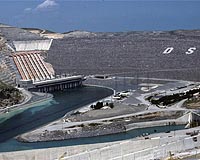| . |  |
. |
Baghdad (UPI) Jul 2, 2009 After years of wrangling, Turkey last month increased the water flow of the Euphrates River into Iraq by 50 percent, helping to boost agricultural harvests. But Iraq, wracked by a decadelong drought and a rundown agricultural sector, still faces a chronic shortage of water because Turkey controls the headwaters of the Euphrates and the Tigris rivers, which rise in the Anatolian Plateau. These mighty rivers gave Iraq its ancient name, Mesopotamia, "the land between the rivers," and for millennia the land was part of what was known as the "Fertile Crescent." The rivers remain Iraq's primary source of water. But the flow has been dramatically cut in recent years as Turkey forged ahead with its ambitious Southeast Anatolia Project. This involves building 22 dams and huge reservoirs, with 19 hydroelectric power plants, along the fabled rivers in nine of Turkey's poorest provinces. The $32 billion project, known by its Turkish acronym GAP, is the centerpiece of Turkey's development plans. It was started in the 1980s and is scheduled for completion in 2013. It will generate 1,200 megawatts of electricity and irrigate thousands of acres of land for crops. All this leaves Iraq at the mercy of its northern neighbor. The Euphrates and Tigris waters are critical for at least half of Iraq's annual grain production and most of its drinking water. Turkey's growing stranglehold on Iraq's water supply is causing dismay in Baghdad, particularly as the government is struggling to restore the economy -- ravaged by decades of war and U.N. sanctions -- and restore political stability six years after the U.S.-led invasion toppled Saddam Hussein. Ankara's strategic leverage is magnified by the fact that one-fifth of Iraq's oil exports from its northern oil fields around Kirkuk, 400,000 barrels per day, run through twin pipelines to the Turkish port of Ceyhan in the eastern Mediterranean. All this bolsters Turkey's drive to restore its pre-eminence in the eastern Mediterranean, the Middle East and Central Asia. "Economic influence means Ankara can keep the Kurds of northern Iraq politically and economic dependent on Turkey," according to an analysts by Strategic Forecasting, a U.S.-based security consultancy. "With riparian issues leaving Baghdad itself dependent to a degree as well, Turkey will be able to maintain a stronger position in Iraq and the Arab world as it continues its geopolitical rise." Relations between the Turkey and Iraq have improved somewhat since Saddam Hussein was overthrown in April 2003, but the water issue rankles Baghdad deeply. GAP, which is more than halfway completed, lies at the core of the dispute. The focus right now is on a bitterly contested dam on the Tigris at Ilisu near Turkey's borders with Syria, through which the Tigris also flows, and Iraq. And this may have been partly behind Ankara's decision to increase the flow level of the Euphrates, which runs directly into Iraq. Turkey's grand plan took a serious blow in December, when German, Austrian and Swiss insurance companies pulled the plug on the $2.6 billion Ilisu dam. They suspended their credit guarantees after concluding that the dam failed to meet 150 standards set by their governments and the World Bank. These include plans to flood more than 80 towns and villages and inundate archaeological sites at Hasankeyf dating back to the Sumerian, Roman and Ottoman eras. European companies poised to participate in the project with contracts worth $530 million had to back out. The German government has insisted that it would not approve export credits until Ankara guaranteed Iraq its minimum water requirements. So it was that on June 29, Iraq's Water Resources Ministry announced that Turkey had increased the flow in the Euphrates to 570 cubic meters a second, up from 360 cubic meters but about half the 2000 level of 950 cubic meters a second. On June 18 Ankara promised to increase the flow to 715 cubic meters a second during July, August and September, after which it would presumably be cut back to 570 cubic meters. The Ilisu dispute may have given Baghdad some breathing space, but Turkey is determined to complete the GAP project, and the long-term prospect does not seem very bright. Share This Article With Planet Earth
Related Links Water News - Science, Technology and Politics
 Turkey boosts Iraq water supplies
Turkey boosts Iraq water suppliesBaghdad (AFP) June 28, 2009 Turkey has increased by more than 50 percent the flow of the Euphrates river to Iraq, the Iraqi water resources ministry said on Sunday, in a timely boost for agriculture. "Turkey increased the flow of the Euphrates today to 570 cubic metres (20,000 cubic feet) a second (m3/s) and we hope that our Turkish neighbours continue to increase water levels to guarantee irrigation for our agriculture ... read more |
|
| The content herein, unless otherwise known to be public domain, are Copyright 1995-2009 - SpaceDaily. AFP and UPI Wire Stories are copyright Agence France-Presse and United Press International. ESA Portal Reports are copyright European Space Agency. All NASA sourced material is public domain. Additional copyrights may apply in whole or part to other bona fide parties. Advertising does not imply endorsement,agreement or approval of any opinions, statements or information provided by SpaceDaily on any Web page published or hosted by SpaceDaily. Privacy Statement |